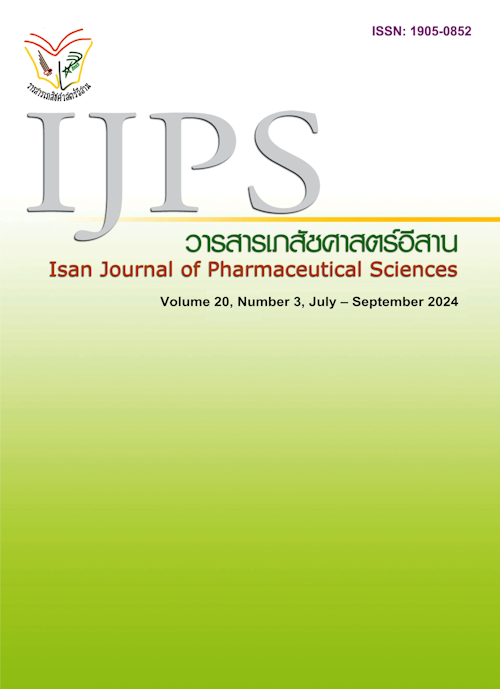Study on the Voluntary Methamphetamine Addiction Treatment Program at Sub-District Health Promoting Hospitals in Amnat Charoen Province Using the Delphi Process
Main Article Content
Abstract
Drug addiction is a global threat, with 271 million drug users worldwide, accounting for 5.5% of the global population. The Thai government has implemented a policy allowing the sub-district health promoting hospitals to treat drug addicts. Objectives: To develop the voluntary methamphetamine addiction treatment program at the sub-district health promoting hospitals in Amnat Charoen province using the Delphi process. Materials and methods: The research was conducted using the Delphi method, where experts were consulted on the treatment model for the voluntary methamphetamine addiction treatment program at the sub-district health promoting hospitals in Amnat Charoen province. The experts involved were responsible for drug addiction treatment at various levels, including the Ministry of Public Health, Thanyarak Khon Kaen Hospital, Provincial Public Health Offices, provincial and district hospitals, and down to the sub-district health promoting hospitals. Results: The experts agreed that incorporating Buddhist practices, which involve beliefs and faith in Buddhism, into the existing psychosocial treatment model may enhance the effectiveness of the voluntary methamphetamine addiction treatment program at sub-district health promoting hospitals in Amnat Charoen province. Conclusion: The treatment model for the voluntary methamphetamine addiction treatment program at sub-district health promoting hospitals in Amnat Charoen province, which integrates Buddhist practices into the treatment process, may lead to more effective outcomes.
Article Details

This work is licensed under a Creative Commons Attribution-NonCommercial-NoDerivatives 4.0 International License.
In the case that some parts are used by others The author must Confirm that obtaining permission to use some of the original authors. And must attach evidence That the permission has been included
References
Department of Medicine Ministry of Public Health (2015). The manual for methamphetamine users care by healthcare providers in Public Health Service; Primary, Secondary and Tertiary. Chiang Mai, Brandiplex Co., Ltd.
Department of Probation Ministry of Justice (2010). Research report on the evaluation of the rehabilitation program for drug addicts in the corrections system (Buddhist Path) Fiscal Years 2008-2010. 2023.
Diclemente, C.C., Corno, C.M., Graydon, M.M., Wiprovnick, A.E., Knoblach, D.J. (2017). Motivational interviewing, enhancement, and brief interventions over the last decade: A review of reviews of efficacy and effectiveness. Psychol Addict Behav. 31(8), 862-887. DOI: 10.1037/adb0000318.
Drageset J (2021). Social Support. In: Haugan G, Eriksson M, editors. Health Promotion in Health Care – Vital Theories and Research [Internet]. Cham (CH), Springer; Chapter 11. PMID: 36315712.
Heilig, M., Mackillop, J., Martinez, D., Rehm, J., Leggio, L., Vanderschuren, L. (2021). Addiction as a brain disease revised: why it still matters, and the need for consilience. Neuropsychopharmacology. 46(10), 1715-1723. DOI: 10.1038/s41386-020-00950-y.
Jones, C.L., Jensen, J.D., Scherr, C.L., Brown, N.R., Christy, K., Weaver, J. (2015). The Health Belief Model as an explanatory framework in communication research: exploring parallel, serial, and moderated mediation. Health Commun. 30(6), 566-576. DOI: 10.1080/10410236.2013.873363.
Jung, Y.H., Kang, D.H., Jang, J.H., Park, H.Y., Byun, M.S., Kwon, S.J., et al. (2010). The effects of mind-body training on stress reduction, positive affect, and plasma catecholamines. Neurosci Lett. 479(2), 138-142. DOI: 10.1016/j.neulet.2010.05.048.
Lodgaew, M., Thaothawong, W., Choochai, A., Katapuñño, T., Soontornchai, S. (2019). Development of buddhism-based rehabilitation for drug users in compulsory system by Wat Tham Krabok, Saraburi province. Dhammathas Academic J. 19(4), 59-70.
Maclean, S., Harney, A., Arabena, K. (2015). Primary health-care responses to methamphetamine use in Australian Indigenous communities. Aust J Prim Health. 21(4), 384-390. DOI: 10.1071/py14126.
Ministry of Public Health (2020). Report on the treatment and rehabilitation of drug-addicted individual. Retrieved 1 Nov, 2020, from http://antidrug.moph.go.th/.
Ministry of Public Health (2017). Manual for facilitator guide in drug addict for the Tambon (sub-district) Health Promoting Hospitals Personnel. Bangkok, The Agricultural Cooperative Federation of Thailand Limited.
Ministry of Public Health (2020). Standard operating procedure for operations: rehabilitation of drug-addicted patients. Nonthaburi, Ministry of Public Health.
Nasa, P., Jain, R., Juneja, D. (2021). Delphi methodology in healthcare research: How to decide its appropriateness. World J Methodol. 11(4), 116-129. DOI: 10.5662/wjm.v11.i4.116.
Niederberger, M., Spranger, J. (2020). Delphi Technique in Health Sciences: A Map. Front Public Health. 8, 457. DOI: 10.3389/fpubh.2020.00457.
Office of Narcotics Control Board (2019). Action plan for prevention, suppressing and drug treatment, year 2019. Bangkok, Office of Narcotics Control Board.
Office of the Narcotics Control Board Ministry of Justice. (2019). Thailand Narcotics Control Annual Report 2019. Retrieved 1 Dec, 2023, from https://www.oncb.go.th/EBookLibrary/Narcotics_Control_Annual_Report2019.pdf.
Samoh, A., Thiangchanya, P., Chukumnerd, P. (2022). A study of radiation oncology nurses' competency. Songklanagarind J Nurs. 42(3):74-85.
Seelakul, A., Charoenchai, W., Sasompolsawat, W., Leela, C., Wiroteurairuang, K., Unsri, D. (2013). Development of the rehabilitation therapy for persons with amphetamine use disorder by basic buddhist teaching of ethics “Ruk-Nuea-Ruk” (Six Saraniya - Dhamma) with five precepts. J Psychiatric Nursing and Mental Health. 27, 29-43.
Soongjit, P., Phratumkaew, S., Sangrung, P. (2019). An application of Buddhist Dharma to promote treatment and reduce the problem for the repeat offenders of the youths addicted drug: A case study of Wat Noonsoongwanaram in Khunhan district Sisaket province. J Graduate Saket Rev. 4(2), 47-62.
Suvetvetin, K., Moolasarn, S., Supapaan, T. (2018). Situation of Methamphetamine Addiction Treatment in the Voluntary Drug Treatment System at the Tambon (sub-district)Health Promoting Hospitals, Amnatcharoen Province. Srinagarind Med J. 33(6), 580-588.
Taweerat, P. (1997). Research Methods in Behavioral Science and Social Science. 8th edition. Bangkok: Charoenphon.
The United Nations Office on Drugs and Crime (UNODC). (2023). World Drug Report 2023 Retrieved 20 Dec, 2023, from https://www.unodc.org/res/WDR-2023/WDR23_Exsum_fin_DP.pdf.
Udomtawe, A. (2008). Rehabilitation of drug addicts with Buddhist principles. Med J Srisaket Surin Buriram Hosp. 23(1), 583-589.
Wisoon, C. (2021). The effects of Buddhist empowerment program in methamphetamine use patients. J Res Health Innov Dev. 2(1), 37-48.
Yingyongmatee, N., Yucharoen, D., Sawangchai, J., Wonglamthong, S., Nimitpornchai, P. (2020). The effectiveness of SKT’s meditation therapy on glucose levelsin diabetic patients with poor glycemic control. Reg 4-5 Med J 39(2), 228-238.


